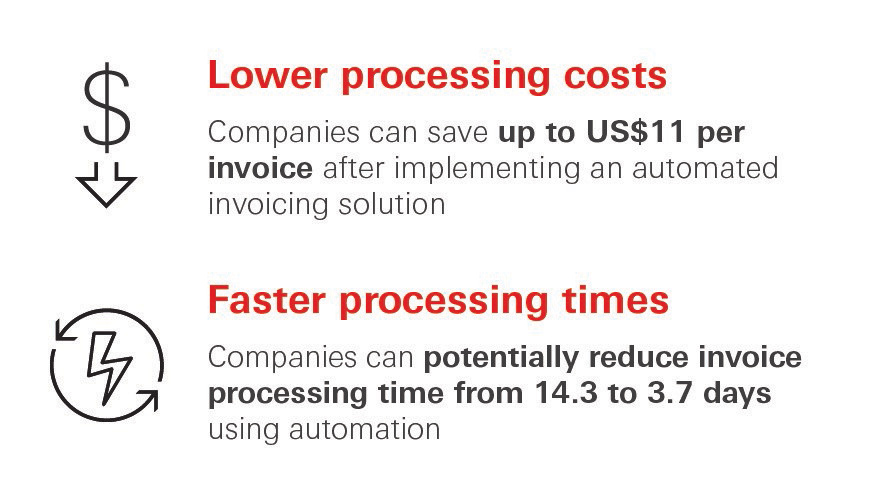- Article

- Accessing Capital
- Improve Financial Ratios
HSBC Commercial Cards: Faster Procurement and Lower Costs for Businesses
“Corporate procurement departments and treasurers are always on the lookout for solutions that use efficient processes and deliver cost savings”, says Lewis Sun, Regional Head of Product, Asia Pacific at HSBC. In this second article in a series of four, he explains how by introducing HSBC’s Commercial Cards into its procurement process, a company can save time and money when purchasing goods and services.
Every company needs to purchase goods and services as part of their day-to-day operations. These might be business travel and entertainment expenses, marketing budget spent on sponsorships or digital advertising, or physical asset purchases – such as IT equipment. All of these purchases have to be processed, which makes efficiency and cost effectiveness key priorities for the treasury team – especially during the challenging business environment created by the COVID-19 pandemic, where cost savings are even more valuable than normal.
Traditional payments – such as automated clearing house (ACH) or real-time gross settlement (RTGS) payments – rely on processes that may not fit for the digital age. Manual invoices can often be the norm, which have to be posted or couriered to a client, and passed from department to department, before securing final approval for payment. Not only is this time consuming, there are risks that the invoice could be lost, which could bring the whole process to a halt and cause a late payment.
Furthermore, paper-based payments leave information scattered across multiple documents, making it hard to complete relatively straightforward reporting, and as a result complicating budget management. Spending analysis and working capital optimisation can also be difficult to conduct.
Commercial Cards are an easy-to-implement method for corporate procurement and treasurers who are looking for efficient alternatives to traditional payment options. By taking advantage of the full range of functionality that Commercial Cards provides, a procurement and treasury department can replace manual processes with more efficient digital alternatives, quickly making significant improvements to procure-to-pay process and operational costs.
By taking advantage of the full range of functionality that Commercial Cards provides, a procurement and treasury department can replace manual processes with more efficient digital alternatives.
Increasing operational efficiency
In short, Commercial Cards help streamline procurement so that relevant stakeholders can enjoy efficient processes that reduce labour and other operational costs. Electronic invoices play an important role here as they avoid the time-consuming steps associated with traditional payment methods. By spending less time on day-to-day processing, treasury is able to concentrate more on strategic issues.
The shift from paper to electronic invoices might not sound like a big difference, but the removal of manual processes is a real cost saver. Companies can save up to USD11 per invoice after implementing an automated invoicing solution, due to lower processing costs1, while automation can potentially reduce the invoice processing time from 14.3 days to just 3.7 days2. For a sizeable company processing a large number of transactions, these benefits add up to meaningful savings, as the treasury becomes more efficient at completing a growing number of payments.
Increasing expense visibility and control
Keeping track of so many purchases can be cumbersome, especially when it comes to reporting and reconciliation.
One of the pain points that treasurers often encounter is making sure that employees understand the policies relating to how they can use Commercial Cards to make both regular and ad hoc purchases. At the same time, keeping track of so many purchases can be cumbersome, especially when it comes to reporting and reconciliation.
To overcome this, HSBC’s Commercial Cards provide an online management and reporting tool that centralises all transactions for the treasury team to keep track of purchasing patterns and spending. Online reporting gives visibility of all cardholder accounts, to view and report on transactions, statements and payments to enable the treasury team to conduct timely reporting and analysis across cardholder spends for multiple accounts balances.
In addition to visibility, HSBC’s management and reporting platform MiVision provides a high degree of control and empowerment on how employees correctly use their Commercial Cards in line with company spending and purchase policies, reducing risk of misuse while allowing employees to use the card for the full range of legitimate uses.
Commercial Card usage is kept compliant via criteria that determines how it can be used. Spend category controls can be managed to apply restrictions on how and where payments are made. For example, a company might block its cards in casinos or retail outlets. It may also wish to implement spend limits on certain transactions, in alignment to the type of service on offer. For example, a company can set a limit to courier services which are typically smaller amounts, and another limit on flights which are more expensive.
As more suppliers accept Commercial Cards as a form of payment for goods and services, procurement departments and treasurers have the option to apply the efficient working practices of cards solutions to a broader range of their procurement process.
To find out more about how your company can use HSBC’s Commercial Cards to make improvements to your procurement process, please contact your relationship manager. The next article of this series is a deep dive into how using Commercial Cards can improve expense analysis and cost negotiations.
1 AMI Partners
2 IDC
2 IDC
Issued by The Hongkong and Shanghai Banking Corporation Limited, Singapore Branch (UENS16FC0010A). The Hongkong and Shanghai Banking Corporation Limited is incorporated in the Hong Kong SAR with limited liability.
This article was prepared by The Hongkong and Shanghai Banking Corporation Limited, Singapore Branch.
The article is intended for those who access it from within Singapore and is not intended for distribution to, or use by, any person or entity in any jurisdiction or country where such distribution or use would be contrary to law or regulation.
The Hongkong and Shanghai Banking Corporation Limited, Singapore Branch ("HSBC") makes no representation or warranty (express or implied) of any nature nor is any responsibility of any kind accepted with respect to the completeness or accuracy of any information, projection, representation or warranty (expressed or implied) in, or omission from, this article. No liability is accepted whatsoever for any direct, indirect or consequential loss (whether arising in contract, tort or otherwise) arising from the use of or reliance on this article or any information contained herein by the recipient or any third party.
This article should be read in its entirety and should not be reproduced, stored in a retrieval system, or transmitted, on any form or by any means, electronic, mechanical, photocopying, recording, or otherwise, without the prior written permission of HSBC.
Copyright © The Hongkong and Shanghai Banking Corporation Limited, Singapore Branch 2020.
All rights reserved.






